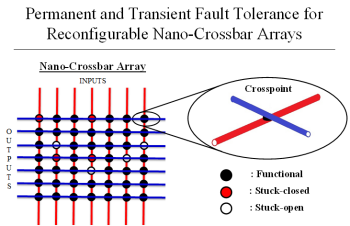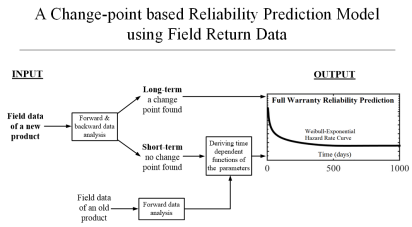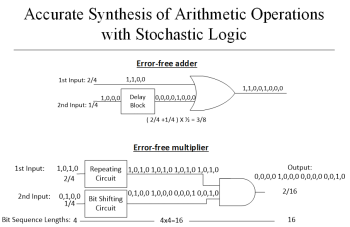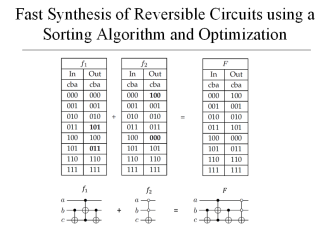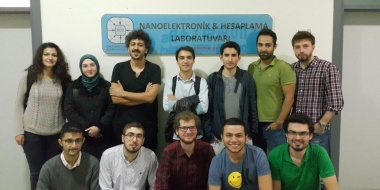Main Page
From NANOxCOMP H2020 Project
(Difference between revisions)
|
|
| Line 9: |
Line 9: |
| | | valign="top" style="padding:8px 8px 0px 8px; background:#f5fffa;" <!--H210 S4 V100--> | | | | valign="top" style="padding:8px 8px 0px 8px; background:#f5fffa;" <!--H210 S4 V100--> | |
| | | | |
| − | Our group, comprised of [[Mustafa_Altun|'''Mustafa Altun''']] and his [[People|scholars & students]], is in the [http://www.ehb.itu.edu.tr/index.php?lang=en Department of Electronics and Communication Engineering] at [http://www.itu.edu.tr/en/ Istanbul Technical University]. In terms of [[Research|'''research''']], we aim to develop techniques in electronic design automation (EDA) and circuit design for emerging nanotechnologies and new computing paradigms. We also have a special interest in electronics reliability in both circuit and system levels. In terms of [[Teaching|'''teaching''']], we offer courses on digital/analog circuit design as well as on computational nanoelectronics.
| + | Nano-crossbar arrays have emerged as a strong candidate technology to replace CMOS in near future. They are regular and dense structures, and fabricated by exploiting self-assembly as opposed to purely using lithography based conventional and relatively costly CMOS fabrication techniques. Currently, nano-crossbar arrays are fabricated such that each crosspoint can be used as a conventional electronic component such as a diode, a FET, or a switch. This is a unique opportunity that allows us to integrate well developed conventional circuit design techniques into nano-crossbar arrays. Motivated by this, we aim to develop a complete synthesis and performance optimization methodology for switching nano-crossbar arrays that leads to the design and construction of an emerging nanocomputer. |
| | | | |
| − | [[Image:website-art-1.png|center|none|550px|link=]] | + | |
| | + | [[Image:Research-nanoarray-1.png|center|none|800px|link=]] |
| | | | |
| | <h2 id="mp-itn-h2" style="margin:0px; width:1010px; background:#F5F5F5; font-size:5%; font-weight:bold; border:0px solid #F5F5F5; text-align:left; color:#000; padding:0em 0em;"> </h2> | | <h2 id="mp-itn-h2" style="margin:0px; width:1010px; background:#F5F5F5; font-size:5%; font-weight:bold; border:0px solid #F5F5F5; text-align:left; color:#000; padding:0em 0em;"> </h2> |
Revision as of 23:14, 9 April 2017
Welcome to the NANOxCOMP Project
|
|
Nano-crossbar arrays have emerged as a strong candidate technology to replace CMOS in near future. They are regular and dense structures, and fabricated by exploiting self-assembly as opposed to purely using lithography based conventional and relatively costly CMOS fabrication techniques. Currently, nano-crossbar arrays are fabricated such that each crosspoint can be used as a conventional electronic component such as a diode, a FET, or a switch. This is a unique opportunity that allows us to integrate well developed conventional circuit design techniques into nano-crossbar arrays. Motivated by this, we aim to develop a complete synthesis and performance optimization methodology for switching nano-crossbar arrays that leads to the design and construction of an emerging nanocomputer.
|
Group news
- Jan. 2017 We are organizing a special session "Circuit Design and Analysis Techniques for Emerging Computing Systems" in SMACD 2017. For the call and submission details, click here.
- Dec. 2016 Our project on stochastic computing and applications in large-area electronics received a grant from the TUBITAK Scientific and Technological Research Projects Funding Program (1001).
- Nov. 2016 We will present our work "Computing with Nano-Crossbar Arrays: Logic Synthesis and Fault Tolerance" in a premier conference on electronic design automation DATE 2017.
- Aug. 2016 Our three papers are recently accepted in journals TCAD, RESS, and MVLSC. All these papers are solely made in our group from Master's studies. Good job!
- Apr. 2016 We will present our work "Accurate Synthesis of Arithmetic Operations with Stochastic Logic" in IEEE-ISVLSI 2016.
- Apr. 2016 We will present our work "Power-Delay-Area Performance Modeling and Analysis for Nano-Crossbar Arrays" in IEEE-ISVLSI 2016.
- Apr. 2016 We will give an invited talk "Circuit Design and Optimization of Nano-Crossbar Arrays" in NanoTR-12.
- Feb. 2016 We will give a plenary talk "Implementation of a Switching Nano-Crossbar Computer" in ACT 2016.
- Jan. 2016 We will present our EU H2020 project NANOxCOMP in a premier conference on electronic design automation DATE 2016.
- PREVIOUS NEWS:
- Dec. 2015 Our project on fault-aware reversible microprocessor implementation received a grant from the TUBITAK Short Term R&D Funding Program (1002).
- Sept. 2015 Our project on nano-crossbar computer implementation received a 724.500EURO grant from the EU H2020-MCSA Research and Innovation Staff Exchange Program (RISE). This project has a consortium of eight international partners and is coordinated by our group; we are one of the few H2020 project coordinators from Turkey.
- Aug. 2015 Our project on sensor and communication systems for phacoemulsification cataract eye surgery is invited to the final exhibition of the TUBITAK Industry Oriented Senior Project Competition (2241/B) as one of the top 40 out of more than 400 projects. The project is cooperated with Novartis-Alcon.
- Aug. 2015 We will present two papers on electronics reliability in ESREL 2015.
- May 2015 We will present our work "Defect Tolerance in Diode, FET, and Four-Terminal Switch Based Nano-Crossbar Arrays" in a globally leading conference on nanocircuits/nanoarchitectures IEEE/ACM-NANOARCH 2015.
- Feb. 2015 We will present our work "Synthesis and Optimization of Switching Nanoarrays" in IEEE-DDECS 2015.
- Nov. 2014 We will present three papers on circuit design techniques for emerging technologies in a premier national conference ELECO 2014.
- Oct. 2014 We will present our work "An Efficient Algorithm to Synthesize Quantum Circuits and Optimization" in IEEE-ICECS 2014.
- Sept. 2014 We will present our work "Warranty Forecasting of Electronic Boards using Short-term Field Data" in a globally leading reliability conference RAMS 2015.
- June 2014 We will present our work "Reliability Prediction of Electronic Boards by Analyzing Field Return Data" in ESREL 2014.
- Feb. 2014 Our project on circuit design and reliability for switching nano arrays received a grant from the TUBITAK Career Program (3501).
- Feb. 2014 Our project on quantum circuit design is supported by the ITU Research Project Support Program (BAP) and the TUBITAK MSc Scholarship Program in Priority Areas (2210/C).
- Oct. 2013 Our project on reliability of appliance electronic cards received a grant from the TUBITAK University-Industry Collaboration Grant Program (1505). The project is cooperated with Arçelik A.Ş..
Our progress by the numbers, 2013-2016
Founded in 2013, our group has made many achievements in its first three years including:
- 1.300.000 TL/$450.000 was received to be spent for our group. $300.000 came from an EU H2020 project and $150.000 came from three different TUBITAK projects. We are the principal investigator (PI) of all these 4 projects.
- 20 peer-reviewed papers were published/accepted. 13 of them are solely made in ECC -- all authors are from our group. 4 of them are coauthored by our collaborators from industry and 5 of them are coauthored by our collaborators from academia.
- 5 Master's students graduated from our group and 5 Doctorate's students joined us.
|
|
|
Joining our group
- For current open positions click here (in Turkish).
- For current open postdoc positions click here.
- Visiting professors/researchers and postdoc scholars are very welcome. Postdoc applicants are highly encouraged to apply for the following programs:
- European Union H2020 Individual Fellowships (MSCA - IF)
- TUBITAK Research Fellowship Program For Foreign Citizens (2216)
- TUBITAK National Postdoctoral Research Fellowship Program (2218)
- TUBITAK Postdoctoral Reintegration Fellowship Program (2232)
- Various funded research projects available for graduate and undergraduate students on the following topics:
- Circuit design and performance optimization for emerging technologies based on nano-crossbar arrays
- Reliability of electronic circuits and systems
- Reversible circuit design
- Stochastic computing
- Approximate computing
Collaborating with our group
- We are wide open to national/international collaborations with academia and industry.
- We are dedicated to establish new partnerships for European Union H2020 and EUREKA work programmes/projects including:
- Future and Emerging Technologies (FET)
- Information and Communication Technologies (ICT) including ICT-05 and ICT-31
- Cluster for Application and Technology Research in Europe on NanoElectronics (CATRENE)
- The projects needed expertise in reliability, circuit design, and electronic design automation
If interested in our group, please contact Mustafa at altunmus@itu.edu.tr or stop by EEF 3005 (coffee guaranteed).
|
|
Selected recent publications
|
Group pictures
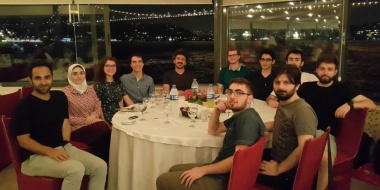 ECC having iftar in Baltalimani, 2016 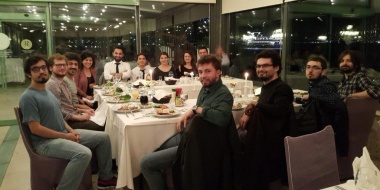 Group dining in Baltalimani, 2015 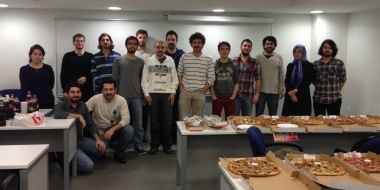 Group meeting with pizza, 2014
|



